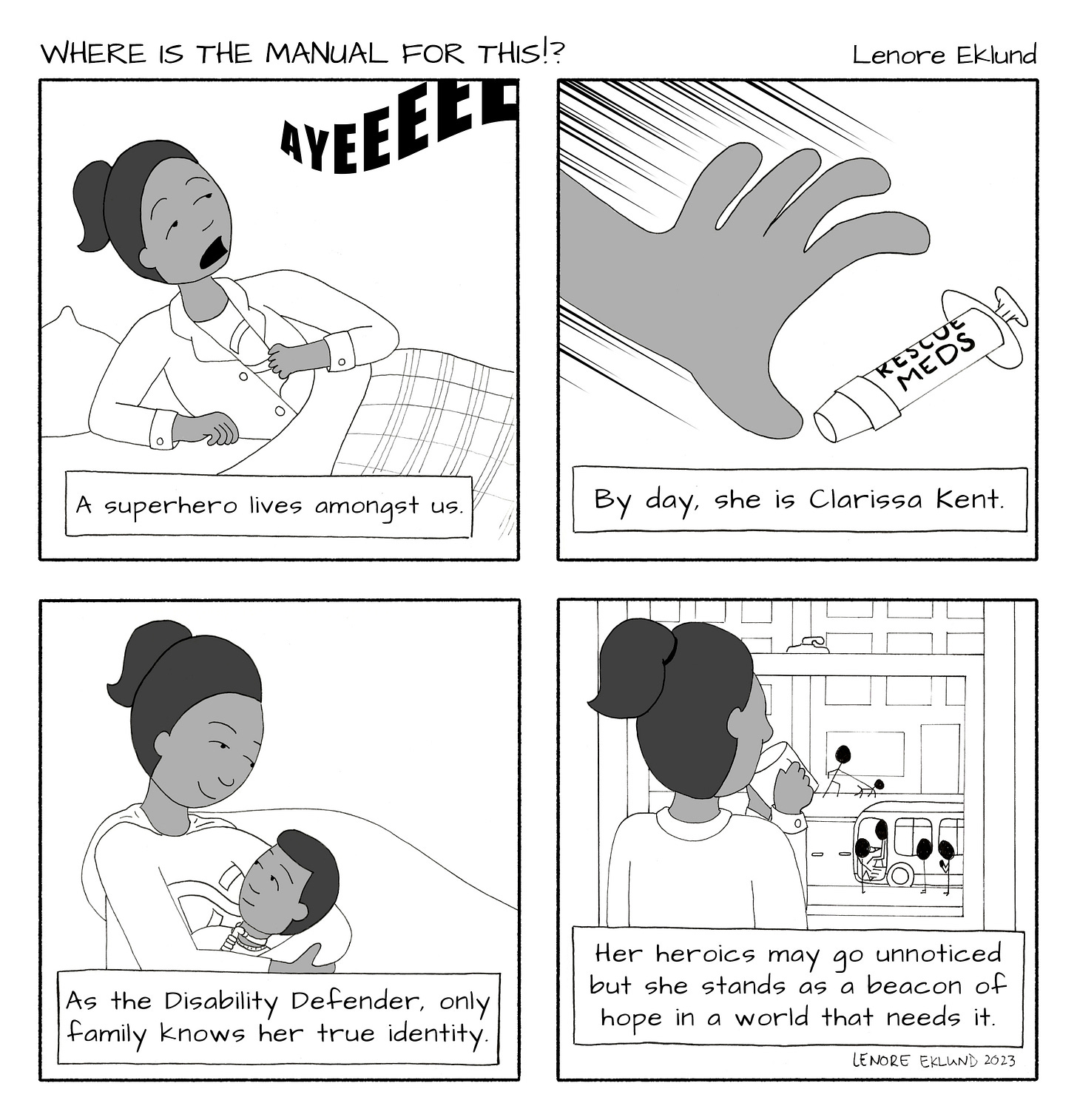Introducing: Clarissa Kent!
Editorial cartoonist Lenore Eklund and I were laughing a while back about a reverse superhero: One who dresses in street clothes to do heroic life-saving activities by day but then on rare occasions, dresses up in a leotard to do… well, absolutely nothing by herself in bed with takeout! That’s how this medical motherhood life feels sometimes.
I love what Lenore has done with the concept and look forward to more in the supermama Disability Defender series. To truth, justice and the medical motherhood way!
The second Sunday of every month Medical Motherhood publishes Where Is the Manual for This?!, an editorial cartoon by Lenore Eklund.
Medical Motherhood’s news round up
Snippets of news and opinion from outlets around the world. Click the links for the full story.
• From The New York Times: “How Educators Secretly Remove Students With Disabilities From School”
[Roseberg, Oregon teen] Dakotah [LaVigne]’s tumultuous educational journey has been marked by a series of tactics, known as informal removals, that schools secretly and sometimes illegally use to remove challenging students with disabilities from class. The removals — which can include repeated dismissals in the middle of the day or shortening students’ education to a few hours a week — are often in violation of federal civil rights protections for those with disabilities.
In a report last year, the National Disability Rights Network, a national nonprofit established by Congress more than four decades ago, found informal removals occurring hundreds and perhaps thousands of times per year as “off-the-book suspensions.” The report said the removals also included “transfers to nowhere,” when students are involuntarily sent to programs that do not exist.
The removals largely escape scrutiny because schools are not required to report them in the same manner as formal suspensions and expulsions, making them difficult to track and their impact hard to measure.
But interviews with families, educators and experts — as well as a New York Times review of school emails, special education records and other documents — suggest that informal removals are pernicious practices that harm some of the nation’s most vulnerable children. Students are left academically stifled and socially marginalized. Their families often end up demoralized and desperate.
“The reality is that there are children in this country who are still considered of insufficient quality to go to school,” said Diane Smith Howard, a lawyer with the National Disability Rights Network. “This would never be deemed acceptable for students without disabilities.”
[…]This week Ms. LaVigne, who is now connected with a group of attorneys, testified to the Oregon state legislature in support of a bill that would limit the use of abbreviated school days in the state. It is one of several efforts in Oregon, including a closely watched class-action lawsuit, to curb or eliminate the practice.
“It might not help Dakotah,” Ms. LaVigne said of her testimony. “But hopefully it will do something for kids in the future.”
• From KGW News Channel 8: “Parents fight to make Oregon's paid caregiver program permanent”
SALEM, Ore. — A group of Oregon parents are fighting to keep a pandemic program in place permanently, calling it a lifeline for their children and their families.
During the federal public health emergency (PHE) that began at the start of the COVID-19 pandemic, parents of children with serious disabilities and medical needs could be their child's caregiver. With the PHE set to expire in May, parents who have benefited from this temporary exception are fighting to create a permanent program within the state.
When the pandemic hit, many things changed for people including the family of Gabriel Triplett.
"I am a dad of a 10-year-old, awesome, disabled boy," he said. "[During the pandemic] it just became extremely unsafe for anyone to allow outsiders in their home, let alone for the most medically fragile kids, so we didn't."
His son, Oscar, qualifies for disability services through Medicaid, including in-home hours staffed by a support worker. Under the PHE, his parents could fill that role.
"The red tape was allowed to fall away and his mom was allowed to be paid to be his caregiver," Triplett said, "And since that happened, my son has not been admitted to the hospital... and being admitted to the hospital was a common thing for us before this program."
Dozens of parents shared similar stories and hope to fund a permanent paid parent caregiver program, citing better, more personalized care on top of a severe lack of support workers; a shortage made worse during the pandemic. This week, many brought those experiences to a committee hearing in Salem. […]
Note: I am a member of Advocates for Disability Supports, the group pushing for a paid parent caregiver program in Oregon and I also testified at this hearing. More on that soon!
• From Disability Scoop: “Biden Renews Calls To Invest In Services For People With Disabilities”
President Joe Biden used his State of the Union address to double down on his plan to reinvigorate the nation’s home and community-based services system.
During the speech this week, Biden called on Congress to invest in services that allow people with disabilities to receive care in their homes.
[…]Last month, a group of federal lawmakers sought to revive [an earlier] proposal by introducing a bill known as the “Better Care Better Jobs Act” that would provide states the opportunity for a permanent 10 percentage point increase in federal Medicaid matching funds for home and community-based services.
The push to invest in home and community-based services comes as disability service providers continue to struggle to attract and retain direct support professionals, a challenge exacerbated by the COVID-19 pandemic. A survey last fall of providers nationwide found that the vast majority are turning away new referrals and have discontinued programs and services.
Medical Motherhood brings you quality news and information each Sunday for raising disabled and neurodivergent children. Get it delivered to your inbox each week or give a gift subscription. Subscriptions are free, with optional tiers of support. Thank you to our paid subscribers!
Follow Medical Motherhood on Facebook, Twitter, TikTok, Instagram or Pinterest. The podcast is also available in your feeds on Spotify and Apple Podcasts. Visit the Medical Motherhood merchandise store.
Do you have a story to share or an injustice that needs investigation? Tell me about it and it may become a future issue.













